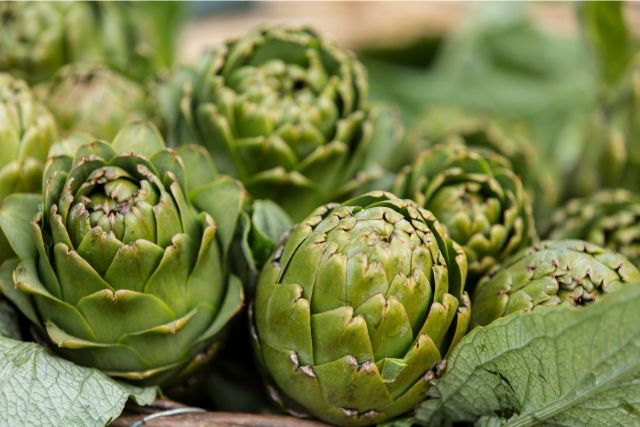Recent Posts
-

- Diabetes-Friendly Nutrition: Smart... 08.12.2024
-

- Nutrition for Chronic... 08.12.2024
-

- Anti-Inflammatory Diet: Food... 08.12.2024
-

- Low-Sodium and Heart-Healthy:... 08.12.2024
-

- Plant-Based Diets for... 08.12.2024
Nature's Detoxifier: The Liver-Boosting Benefits of Artichokes

Be a liver lover with the amazing benefits of Artichokes!
The artichoke is the unopened flower bud of a thistle, which is also known as a globe artichoke. It is commonly understood to be a vegetable due to the fact that it is consumed in such manner. The plant is related to the aster family, and the bud is picked before the flower opens. Getting to the edible sections of an artichoke requires some effort, since preparation of this vegetable is not very straightforward.
The "bracts" of the bud are the outermost leaves, and the tips of these leaves bear thorns. The underside of the leaves may be eaten, and the leaves that are closest to the stem are also sensitive enough to be consumed. After removing them, you will uncover a choke, also known as the hairy core, on top of the heart, followed by the stem. The most meaty portion of an artichoke is called the heart, and the edible portion of the stem is located in the middle.
The artichoke has a taste that is often described as nutty. In thornless types, some of this is lost, which is why many chefs prefer to deal with the thorns rather than risk losing the taste. Thorns may be removed with a sharp knife.
Artichokes offer a variety of health advantages in addition to their distinctively nutty taste, one of which is that they are beneficial to the liver.
Providing relief for occasional stomachaches
Indigestion and heartburn are two of the most common stomach complaints that may be helped by taking artichoke extract, which is one of the artichoke extract's most well-supported uses. In a trial conducted in 2003, patients who suffered from persistent, unexplained dyspepsia were given either artichoke extract or a placebo. Those who took artichoke extract reported improvements in their dyspepsia and overall quality of life, in comparison to those who took the placebo.
Properties that fight cancer
Research conducted on cancer cells demonstrates that artichoke extract may have potential as a therapy for cancer. Squamous cell cancer lines were given artichoke extract in the context of a research. According to the scientists, the extract from artichoke seemed to both inhibit the development of cancer cells and kill them.
Despite the fact that this is an encouraging finding, the research did not investigate cancer in human bodies. Artichoke extract has not been proved to be an effective treatment for cancer in people by any study to far.
Keeping control of cholesterol
According to the findings of several studies, the extract of artichoke may help lower cholesterol. Nine previous research on this subject were combined into one for the purpose of a meta-analysis. According to the findings, artichoke extract has the potential to considerably lower levels of all three types of cholesterol: total cholesterol, low-density lipoprotein cholesterol, and triglycerides.
Could aid in the control of blood pressure
People who suffer from hypertension may benefit from using artichoke extract. In point of fact, a number of studies have shown that taking an artichoke supplement may dramatically lower both the systolic and diastolic blood pressure levels in those who already have high blood pressure.
Additionally, artichokes are an excellent source of the mineral potassium, which has a role in the control of blood pressure.
May be beneficial to the digestive system.
Artichokes are an excellent source of fiber, which may help maintain the health of your digestive system by encouraging the growth of beneficial bacteria in the gut, lowering the chance of developing some types of bowel cancer, and relieving symptoms of constipation and diarrhea.
Inulin is a form of fiber that functions as a prebiotic, and artichokes are a good source of this substance. Artichoke extract may also be helpful in alleviating the symptoms of indigestion, such as bloating, nausea, and heartburn, according to the findings of some earlier research.
Wellness of the liver
There is some evidence that extract from artichoke leaves may help preserve or mend the liver. In a research conducted on mice that had nonalcoholic fatty liver disease, it was shown that giving the mice artichoke extract decreased the signs of the condition, including increases in blood lipids and bilirubin. The breakdown of red blood cells is referred to by the term bilirubin. Mice who were given artichoke extract as a therapy showed a reduction in inflammation as well as a decrease in the number of liver cells that died.
Disclaimer: The information provided in this article is for general information purposes only. All information in this article is sourced from other websites, and we do not represent any rights regarding the contents and information on the site. All rights belong to their original owner.
Sources:





